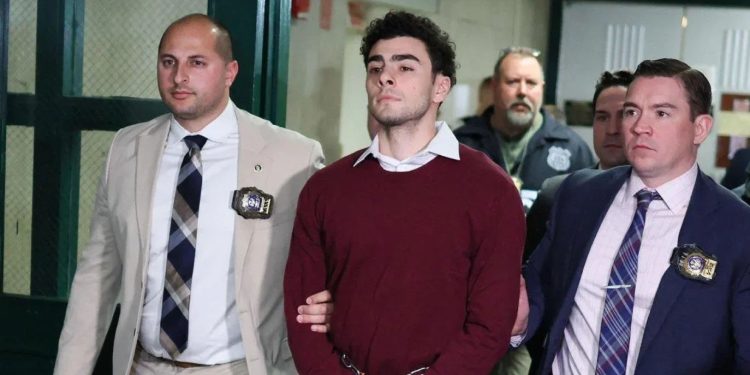Luigi Mangione, the 26-year-old accused of killing UnitedHealth CEO Brian Thompson, has pleaded not guilty to murder and terrorism charges in state court.
The legal battle is set to proceed in both state and federal courts, as Mangione faces a complex web of accusations.
His lawyer, Karen Friedman Agnifilo, criticized the dual cases, describing them as “highly unusual” and confusing for the defense.
Mangione’s arraignment took place in Manhattan, where he entered his plea on state charges.
However, he has not yet submitted a plea for the federal case, which includes accusations of stalking, interstate murder, and the use of a firearm in committing the crime.
If convicted on federal charges, Mangione could face the death penalty, though New York abolished capital punishment in 2004.
Conflicting charges complicate legal defense
The state charges allege Mangione intended to “intimidate or coerce a civilian population” and influence policy, while the federal case focuses on crimes against an individual. According to Friedman Agnifilo, this creates a legal paradox.
“He is being treated like a human ping-pong ball between these two jurisdictions,” she said.
I’ve never seen anything like this in my 30 years of practicing law.
A significant point of contention is the lack of evidence provided by the Manhattan District Attorney’s office to Mangione’s defense team.
At the hearing, Friedman Agnifilo expressed frustration over the absence of discovery materials, which are critical for preparing the defense.
A state prosecutor responded that the evidence handover would begin shortly.
Evidence points to anti-corporate motive
Federal prosecutors revealed that when Mangione was arrested, he carried a notebook filled with writings expressing hostility towards the health insurance industry and wealthy executives.
Additionally, a handwritten letter in his possession referred to health insurers as “parasitic” and criticized corporate greed.
According to law enforcement, Mangione was also found with a firearm that matched shell casings recovered from the crime scene.
Bullets discovered near Thompson’s body were inscribed with the words “delay,” “deny,” and “depose,” echoing slogans used by critics of health insurance practices.
Manhattan District Attorney Alvin Bragg emphasized that Mangione’s intent was to “sow terror.”
The shooting occurred in a busy commercial area during peak business hours, amplifying its impact. Bragg argued that such an act met the criteria for terrorism under state law.
Origins and implications of New York’s anti-terrorism statute
New York’s anti-terrorism law, under which Mangione is charged, was enacted in the aftermath of the September 11 attacks.
The legislation broadens the scope of terrorism to include crimes intended to intimidate civilian populations or influence government policy.
It elevates certain offenses to more severe sentencing categories.
Mangione’s case is one of only a few instances where the charge of “murder in furtherance of an act of terrorism” has been applied.
While the law is often invoked in cases involving gang violence or extremist plots, its use in a corporate-targeted killing is rare.
Examples of the statute’s previous applications include plots to bomb synagogues, efforts to support the Islamic State group, and racially motivated attacks. Prosecutors argue that Mangione’s alleged targeting of Thompson fits the law’s broad definition of terrorism.
Dual jurisdiction raises fair trial concerns
The overlapping state and federal cases have raised questions about Mangione’s right to a fair trial. Friedman Agnifilo cited public comments from officials, including New York Mayor Eric Adams, as potentially prejudicial.
“This is a young man being used as political fodder,” she said. Mangione’s high-profile transfer to New York by helicopter, accompanied by armed guards, was criticized as excessive.
Judge Gregory Carro assured that Mangione’s trial would remain fair, though he acknowledged his inability to control media narratives outside the courtroom
The state prosecutor noted that the volume of evidence in the case was among the largest he had encountered.
Corporate response and broader impact
Thompson’s killing sent shockwaves through the corporate world. In response, several major companies removed executive profiles from their websites and canceled in-person shareholder meetings.
Some businesses advised employees to work remotely as a precautionary measure.
This reaction underscores the chilling effect such incidents can have on high-profile executives and corporate operations.
Deputy Police Commissioner Rebecca Weiner remarked that the response aligned with the intent behind New York’s anti-terror laws—to prevent acts designed to instill widespread fear.
As the case unfolds, Mangione’s trial is expected to attract significant attention, not only for its legal complexity but also for the broader questions it raises about corporate security, the application of anti-terror laws, and the intersection of federal and state legal systems.
The post Luigi Mangione pleads not guilty to murder and terrorism charges appeared first on Invezz










